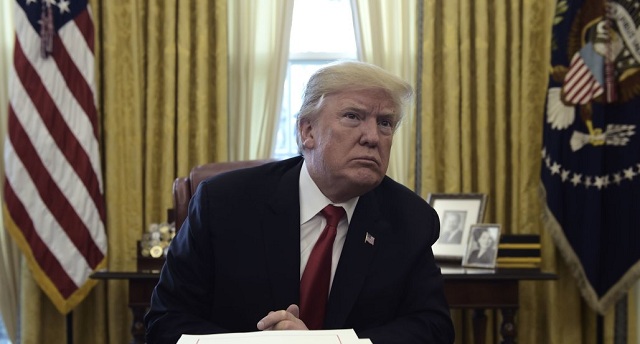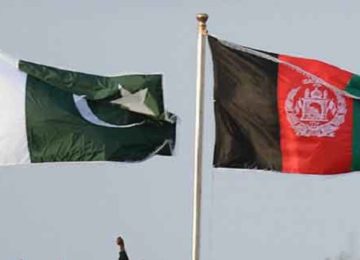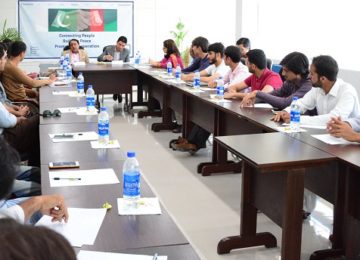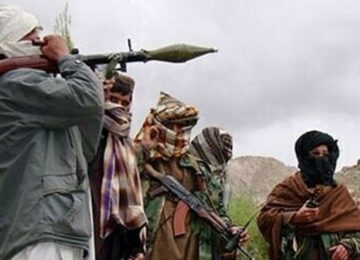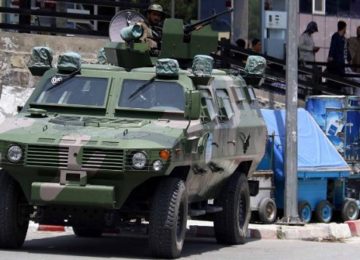The Indo-Trumpian nexus will only exacerbate Afghan crises.
Whoever is whispering anti-Pakistan axioms into the ears of President Donald Trump is certainly not serving the right cause. They should remember that unlike the anti-Iran and anti-Syria non-state actors that the US publicly finances and arms, Pakistan is not a non-state actor. Neither is it a push-away like Myanmar. It deserves the kind of respect from the US and its allies that countries such as China, Russia, Turkey and Iran accord to it as a full member of the United Nations.
And whoever in Afghanistan is cheerleading this tweet (“United States has foolishly given Pakistan more than 33 billion dollars in aid over the last 15 years, and they have given us nothing but lies & deceit, thinking of our leaders as fools”) should understand that the Indo-Trumpian nexus will only exacerbate their country’s multiple crises.
By cheering to the Indo-US song on Pakistan, these Afghan leaders forget one fundamental bitter reality; India and the US are only investing in the continued instability of their country. Based on its short-term investments to outdo Pakistan and carve out strategic space for itself, India has, of course, successfully made strategic inroads into the Afghan establishment and ruling elite. But by pushing relentless anti-Pakistan narratives, both India and the US are investing in a perpetual state of crisis in Afghanistan. How? US Afghan expert, Professor Barnett Rubin explained in July 2017 in the War on the Rocks journal:
“Military and economic access to landlocked Afghanistan depend on transit through Pakistan, Iran, or Russia — all of which some in the Trump administration and Congress seem bent on confronting simultaneously. The only alternative, a path that snakes from northwest Afghanistan to Turkey through Central Asia and the Caucasus via the Caspian Sea, lacks capacity and is vulnerable to both Russian and Iranian pressure. Afghanistan’s forbidding location poses obstacles to overextended U.S. ambitions. No matter how great President Donald Trump makes America, he cannot win the war on geography.”
The Trump tweet also brought out the confusion and paradoxes within Afghanistan, as was evident in a Twitter statement by former president Hamid Karzai: “President @realDonaldTrump tweet on Pakistan’s duplicitous position over the past 15 years is vindication that the war on terror is not in bombing Afghan villages and homes but in the sanctuaries beyond Afghanistan. I welcome today’s clarity in President Trump’s remarks and propose a joint US – regional coalition to pressurise the Pakistan military establishment to bring peace to not just Afghanistan but the entire region.”
This also makes the counter-terror war and expectations from Pakistan really suspect. How can Pakistan alone help stabilize Afghanistan. As Rubin underscores, harping on the “do more” will never secure peace in Afghanistan
In November, Karzai had accused the US of working with the Islamic State of Iraq and the Levant (ISIL) in his country. In an interview with Al Jazeera’s UpFront, Karzai said the US government had allowed ISIL (or ISIS), to flourish inside Afghanistan.
Prof. Rubin insists that the US cannot both stabilise Afghanistan and establish a long-term military presence here. It can fight a forever war against varying permutations of adversaries, or it can use its military presence as leverage to negotiate a settlement between Afghanistan, its neighbors, and the Taliban. Such a settlement would provide for the ultimate withdrawal of U.S. forces while preserving safeguards against terrorism through international partnerships, not military expansion. As Rubin puts it, that settlement will be sloppy and unstable, but hardly more so than the conflicts the United States will perpetuate by seeking to entrench a permanent military presence in a landlocked country whose neighbors do not want it there. Rubin suggests these are two mutually exclusive objectives as much as a desire for peace in Afghanistan to the exclusion of its strategic neighbours such as Iran, Central Russian and by implication Russian.
This also makes the counter-terror war and expectations from Pakistan really suspect. How can Pakistan alone help stabilize Afghanistan. As Rubin underscores, harping on the “do more” will never secure peace in Afghanistan. It clearly unfolds a new phase of campaign targeting Pakistan alone and this raises multiple doubts about the real intent. The Trump tweets on the wave of protests in Iran or his “bigger nuclear button” response to the North Korean leader might spell trouble not only for the region but for the US itself as it will likely face isolation within Europe and NATO too because of a frenzy that is typically associated with cowboys.
One would assume that Pakistan’s measured response thus far is also guided by Chinese wisdom and cool diplomacy, which is anchored in measured, dispassionate responses rather than knee-jerk reactions.
This by no means absolves Pakistan of its responsibility to pursue peace in Afghanistan as transparently as possible, without stoking anti-US sentiment or invoking jingoistic narratives aimed at India and Afghanistan. Pakistan must correct its own internal and external policies through an inclusive and credible way under the guidance of both China and Russia as well as with support from Iran and Turkey. Blunting the fallout from Trump requires a coherent policy that draws respect from all its friends and neighbours.
The author Imtiaz Gul is the Executive Director of the Center for Research and Security Studies (CRSS). This article originally appeared in The Friday Times , January 05, 2018. Original link.
© Center for Research and Security Studies (CRSS) and Afghan Studies Center (ASC), Islamabad.



